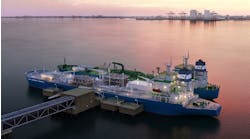ADIPEC 2023: O&G companies implementing AVEVA digital tools as energy transition pressures increase
By Ariana Hurtado, Editor and Director of Special Reports
Software provider AVEVA assists upstream operators with real-time production optimization, equipment monitoring, oilfield analytics and enterprise decision-making.
For example, AVEVA signed a memorandum of understanding (MoU) in April of this year with Petrofac in which AVEVA will assist with the digital transformation of the end-to-end supply chain system process as well as support the delivery of Petrofac’s net-zero targets using AVEVA's sustainable engineering solutions.
And in March, AVEVA partnered with Azule Energy, Angola’s largest independent oil and gas operator, to reduce Azule's costs, improve safety and unlock new production opportunities using AVEVA’s cloud, Software-as-a-Service and digital twin technologies.
That same month FPSO contractor Yinson Production entered into an MoU with AVEVA to enable it to develop fully autonomous and sustainable FPSO solutions. The goal is to operate an FPSO with minimal human involvement and eventually become fully autonomous.
In discussions with Offshore, Rashesh Mody, AVEVA's executive vice president of business strategy and realization, and a speaker at this year's ADIPEC 2023 event, he shares what challenges are keeping offshore energy business executives up at night and the digital solutions that can potentially address those issues.
OFFSHORE: As an industry expert, what is the key issue facing offshore energy operators today? What's the solution?
Here is how it is done: operators need to leverage digital technology to increase production yields and drilling efficiency and therefore maximize the use from current assets at minimum energy consumption. Technologies that provide real-time information of equipment performance coupled with AI and machine learning models, improve efficiency, optimize maintenance to ensure minimum unplanned downtime and ensure the best use of resources.
When it comes to ensuring a stable supply, safety and reliability are paramount. This would include enabling remote working with cloud-embedded digital solutions to operate, train and provide guidance. Additionally, working virtually helps reduce costs, while also helping to meet the challenge of attracting talent into what is considered a conservative market. Going forward, skillful connected workers play a major role in improving agility, efficiency and compliance.
Decarbonizing existing assets and facilities requires the use of digital solutions to monitor and optimize the carbon footprint. Also, adopting a digital engineering approach to speed up engineering cycles, while simultaneously lowering project risks, is the way to deliver capex efficiently and slowly diversify.
OFFSHORE: What do offshore energy industry executive management leaders need to know about the upcoming year or two?
MODY: In the coming years, the upstream market forecast is quite positive. However, the energy transition pressures will increase, and we will see more environmental regulations across the globe. Operators will need to accelerate their low-carbon transitions by adopting electrification where possible and increasing capex investments to adapt existing facilities and build new ones to operate at a lower carbon intensity and diversify their portfolio.
Digital technologies will play a critical role to speed up new processes, enhance connected workers with information and insights and new ways of work so offshore operators can align their business and sustainability goals.
OFFSHORE: How can offshore energy operations leverage the full potential of AVEVA's digital twin technology?
MODY: The development of a fully autonomous and sustainable FPSO is a good example. Using digital twins of FPSO vessels (virtual models designed to accurately reflect the floating structure) allows the capture of engineering and operational data through the complete asset life cycle to improve visualization, reliability and efficiency.
A growing trend in the energy industry is for FPSO vessels to be operated with minimal human involvement. The vision is for them to become fully autonomous. This can greatly enhance the energy and resource efficiency of assets, whilst significantly lowering emissions.
It can also reduce human error and manual intervention, leading to stronger safety and environmental performance through low-carbon operations. AVEVA has been partnering with oil producers for a long time. Our engineering tools are largely used for design and construction for FPSO and other types of vessels, while, on the operations front, the AVEVA PI System is the main solution for operations data management helping increase reliability and safety offshore.
OFFSHORE: What are your company's key focus areas heading into 2024 that ADIPEC attendees would want to know?
MODY: This year at ADIPEC, AVEVA will spotlight digital solutions that enable industrial companies to accelerate the energy transition and to drive measurable emission reductions, including for traditionally carbon-intensive industries. The entire AVEVA portfolio of digital solutions will be showcased through three demo pods spotlighting:
- How an integrated ecosystem relying on AVEVA Data Hub can bring to life the concept of connected Emirates while supporting the energy transition of the UAE and the Middle East (Shape the Connected Future corner).
- How the synergy between Schneider Electric's EcoStruxure Power and Process and AVEVA's solutions help to design, build and operate more efficient plants, combining process and energy efficiency (Design & Build the Future corner).
- How providing the Connected Worker with the most relevant information for more effective decision-making will improve the efficiency and effectiveness of operations in the energy ecosystem (Operate & Optimize the Future corner).
AVEVA experts will demonstrate their software, including AVEVA’s Digital Twin technology, that helps to achieve superior performance in carbon neutrality, value chain optimization products, asset performance management solutions and more. Additionally, attendees will have the opportunity to see firsthand how the AVEVA Unified Operations Centre provides a 360-degree view of plant operations with increased visibility of energy sources, consumption and greenhouse-gas emissions data.
AVEVA will be exhibiting in Hall 4, booth 4410, where senior representatives and experts will meet with customers and partners to share their global success stories and insights on how to accelerate the adoption of renewable technologies for a sustainable future.
AVEVA will also hold demonstrations at its partners’ booths. Schneider Electric will present AVEVA Leak detection system. Meanwhile, Microsoft will highlight how AVEVA Connect supports industrial companies in driving innovation, growth and sustainability, offering a cloud platform designed to meet customers' needs.
10.05.2023






